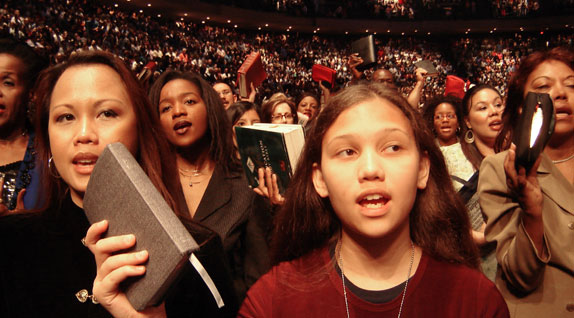Religious Experiences of Women
Written by Elizabeth Speigle
Women form the majority of nearly all religious groups in Costa Rica. Thought by many to be a disempowering place for women, and largely ignored by feminist scholars, religion has nonetheless profoundly affected women’s lives in Costa Rica. Until recently, over ninety percent of Costa Ricans practiced Roman Catholicism, the official religion of the country. Since the latter decades of the twentieth century, however, there has been a significant increase in participation in the Protestant church as well, currently about fourteen percent of the population. Of this group, the Pentecostal church has grown the fastest, and comprises the largest amount of Protestants in Latin America.
Roman Catholicism and Pentecostalism, as well as many of the smaller religious groups, are steeped in patriarchal history. Not only do males dominate leadership positions, the very language used in religion is often disempowering for women. The church has also been accused of controlling women’s sexuality. Despite strong statements regarding the negative impact religion can have on women’s lived experience, religion can also be a place of empowerment for women in Costa Rica.
Many women have found that conversion to Pentecostalism has improved their power and status in their homes. In Costa Rica, as in much of Latin America, where machismo culture is prevalent, men often have problems in their private lives with alcoholism, abuse, and infidelity. Pentecostals promote a more ascetic lifestyle of marital fidelity, fiscal conservatism, and aversion to excessive drinking or drug use. Many women have testified that their husbands become more involved at home, and their marriage relationship is more egalitarian, when they convert to Pentecostalism.
Women have also found collective support and empowerment through their experiences with religion in Costa Rica. Church provides a gathering place for socializing that many women don’t get otherwise. Also, there is financial support through many churches, and “a place is provided for women to pool their meager resources, share child-care needs, [and] support each other financially and emotionally during emergencies” (Hallum).
Women also have opportunities for leadership in Pentecostal churches. Pentecostals believe in the “priesthood of all believers,” so women as well as men are able to preach, testify, and heal using their Spirit-given gifts. Their roles in the church can “provide a bridge to expanding roles” (Drogus), and give women experience and skills, such as public speaking and fundraising, for further leadership opportunities.
 The ways in which religion empowers women relate to values noted in the Costa Rican culture as well as the Costa Rican women’s movement. Family and community are values of many Costa Ricans that are reflected in religion, especially noting the financial and emotional support as well as the tendency toward equality in the home for those who convert to Pentecostalism. Religion, however, is not expected to be the only or best solution for women’s empowerment in Costa Rica. There are many organizations and institutions which focus on community and domestic support as well as opportunities for leadership, similar to the goals of religious empowerment for women. Religion is a vital part of life for many Costa Rican women, and it is important to recognize how it can be a place of empowerment and liberation for women.
The ways in which religion empowers women relate to values noted in the Costa Rican culture as well as the Costa Rican women’s movement. Family and community are values of many Costa Ricans that are reflected in religion, especially noting the financial and emotional support as well as the tendency toward equality in the home for those who convert to Pentecostalism. Religion, however, is not expected to be the only or best solution for women’s empowerment in Costa Rica. There are many organizations and institutions which focus on community and domestic support as well as opportunities for leadership, similar to the goals of religious empowerment for women. Religion is a vital part of life for many Costa Rican women, and it is important to recognize how it can be a place of empowerment and liberation for women.
References:
Brusco, Elizabeth. “The Reformation of Machismo: Asceticism and Masculinity among Colombian Evangelicals.” In Rethinking Protestantism in Latin America. Ed. Virginia Garrard-Burnett and David Stoll. 143-158. Philadelphia: Temple University Press, 1993.
Drogus, Carol A. “Private Power or Public Power: Pentecostalism, Base Communities, and Gender.” In Power, Politics, and Pentecostals in Latin America. Ed. Edward L. Cleary and Hannah W. Stewart-Gambino. 55-75. Boulder, CO: Westview, 1997.
Hallum, Anne M. “Taking Stock and Building Bridges: Feminism, Women’s Movements, and Pentecostalism in Latin America.” Latin American Research Review 38.1 (2003): 169-186. Academic Search Premier. EBSCO. 10 June 2009.
Smilde, David A. “Gender Relations and Social Change in Latin American Evangelicalism.” In Coming of Age: Protestantism in Contemporary Latin America. Ed. Daniel R. Miller, 39-65. New York: University Press of America, 1994.
Steigenga, Timothy J. The Politics of the Spirit: The Political Implications of Pentecostalized Religion in Costa Rica and Guatemala. Lanham, MD: Lexington Books, 2001.